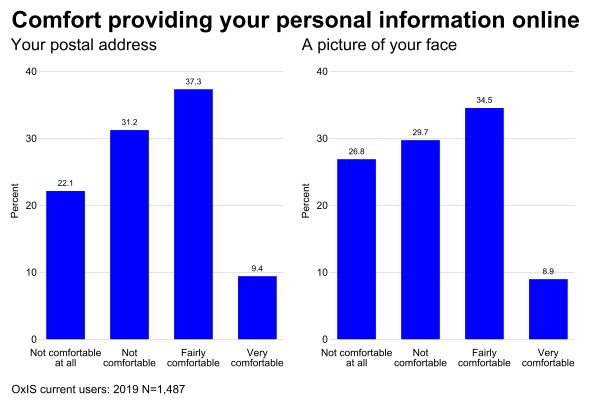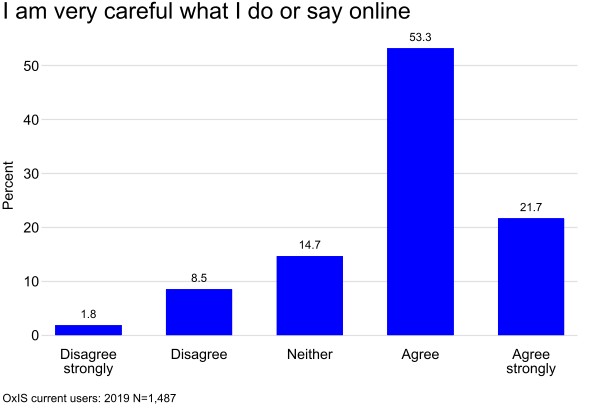Written by Grant Blank, William H. Dutton and Nico Buettner
The advent of social media has left many commentators worried about whether Internet users expose too much personal information online. However, the Oxford Internet Survey (OxIS) conducted in 2019 by the Oxford Internet Institute at the University of Oxford suggests that privacy is more complicated than it is usually understood. The survey results show that public attitudes are not simple. The general public seems well aware of privacy threats, yet a significant portion of the population says that they are comfortable revealing personal information about themselves online. Let’s look at the data.
Much of public discourse about the social consequences of the internet has claimed that many Internet users are careless in revealing personal information online. While such claims may be rooted in examples of incautious Internet behavior, such behavior is far from universal. Most people agree that the use of computers and the Internet threatens their personal privacy (55%). Only a quarter of the British public does not see a threat (the remainder neither agree nor disagree). Part of their concern may be how much personal information is accessible online. Almost half of Britons (46%) agree that “People can find personal information about me online”, while about a third disagree (34%), the remaining 20% neither agree nor disagree. Over half of the population agrees that “It is difficult to delete personal information once it is online” (57%).
The public’s concern about privacy may have had an effect on their online behavior, encouraging presentation of self with caution and care. Awareness that online activity may be public behavior is widespread with three-quarters of adults agreeing that “I am very careful about what I do or say online” (75%). Only about one person in ten disagrees (10%). Online caution has been stable since 2013, when almost the same proportion of adults agreed with the same question (78%).
Despite these privacy concerns a substantial portion of the population feels comfortable providing personal information online. Almost half of the population says they are fairly or very comfortable providing their postal address online (47%). Despite a long-standing British concern with people’s faces appearing in public media, more than four in ten report being comfortable with online pictures where their face is visible (43%). This also means that majorities are not comfortable with the appearance of either their address or their face online. It is striking that public attitudes toward privacy seem to vary widely. Some people clearly want more privacy and feel threatened. Others do not feel the threat and are comfortable providing personal details online.
In these responses we see clear differences of opinion about online privacy. However, these differences might not reflect naiveté about the use of the Internet and social media. Instead they may reflect genuine disagreement about the nature of privacy threats. There are two issues here. First, are the questions still relevant? The questions we asked in OxIS are standard questions used by social scientists for decades to measure privacy concerns. For example, we asked if people are comfortable putting their photograph online and we find that 57% of Internet users say they are not comfortable. But what does this response mean when 72% of Internet users in Britain use Facebook? There is also a common sense issue: during the pandemic almost everyone with access to the Internet shopped online, so why do we ask if people are comfortable putting their address online? We ask if people can find “my personal information online” but 82% of British Internet users have a social media account, and many use social media in order to be found and also to find friends. The technical changes in the Internet and social media create a dramatically different environment than the computing milieu of the 1970s, when many of the questions about privacy began to be asked. Let’s get with the times!
Second, does the policy response reflect the actual facts of online privacy? Examples like photos on Facebook, or personal information on social media illustrate how complicated privacy has become. Privacy protection has to deal with contradictions. These contradictions are not widely recognized. Political action to protect privacy clashes with political interest in encouraging people go online to enjoy the benefits of the Internet, not to mention encouraging safety in a pandemic. It may be time to look hard at ourselves as academics and also policy-makers for not applying more common sense and thought to how we define, think about and measure public attitudes toward online privacy.
* * *
Our data were collected as part of the 2019 wave of the Oxford Internet Survey (OxIS). They are a random sample of individuals living in England, Scotland and Wales. Interviews were conducted in respondents’ homes during January-March. The total sample was 1,818 respondents. The data used in this post include only the 1,487 Internet users. All the results are weighted by age, gender and region to match population proportions.


